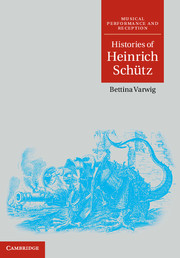Book contents
- Frontmatter
- Contents
- Abbreviations
- Music examples
- Figures
- Acknowledgments
- Introduction
- Chapter One Trumpets and drums (Psalmen Davids, 1617)
- Chapter Two Echoes, mirrors and masks (Dafne, 1627)
- Chapter Three Life, death and afterlife (Musicalische Exequien, 1636)
- Chapter Four Old and new worlds (Geistliche Chor-Music, 1648)
- Conclusion
- Chronology
- Bibliography
- Index
Conclusion
Published online by Cambridge University Press: 05 November 2011
- Frontmatter
- Contents
- Abbreviations
- Music examples
- Figures
- Acknowledgments
- Introduction
- Chapter One Trumpets and drums (Psalmen Davids, 1617)
- Chapter Two Echoes, mirrors and masks (Dafne, 1627)
- Chapter Three Life, death and afterlife (Musicalische Exequien, 1636)
- Chapter Four Old and new worlds (Geistliche Chor-Music, 1648)
- Conclusion
- Chronology
- Bibliography
- Index
Summary
The Heinrich Schütz who has filled the pages of this book has had a troubled history. Though he was admired by his contemporaries, his final decades were overshadowed by his increasing irrelevance in Dresden's musical life. When he died in 1672, his output quickly fell into disuse; as Johann Caspar Printz attested in 1690, it was forty years back, ‘around the year 1650’, that Schütz had been regarded as the ‘very best German composer’. Moreover, rapid fluctuations in historical perspective meant that the Schütz commemorated at his death was already a markedly changed character from the cosmopolitan court composer we might picture in the 1620s and 1630s. If there is no reason to doubt that Schütz was a devout Lutheran believer, the epitaph ‘Assaph Christianus’, allying him with the famed biblical singer of the same name, hardly offers a rounded picture of his status and activities. Yet this narrowed vision, of a composer who kept the art of composition ‘pure’ against those of his peers who ‘only pipe along in a worldly manner’, anticipated one of the principal trends of later Schütz reception, when the Protestant renewal movement of the early twentieth century absorbed and reinforced his image as a purveyor of Lutheran dogma. Meanwhile, alternative portrayals developed alongside, each serving the preoccupations of other listening communities: Schütz as musical dramatist, as German nationalist, and even, in the official records of the German Democratic Republic, as a closet Marxist – a reading which, despite its ideological bias, deserves credit for questioning the perception of Schütz as exclusively a man of the church. In most of these incarnations, however, Schütz continued to hover in the shadow of the more famous German masters – a lesser precursor of Bach, a cipher for a traditional kind of craftsmanship, a dependable but peripheral player in the narrative of national musical greatness. And once this dominant narrative came under attack in late twentieth-century musicology, his association with the Germano-centric canon pushed the composer yet further to the margins, cementing the status of Schütz scholarship and performance as a minority interest.
- Type
- Chapter
- Information
- Histories of Heinrich Schütz , pp. 213 - 215Publisher: Cambridge University PressPrint publication year: 2011

